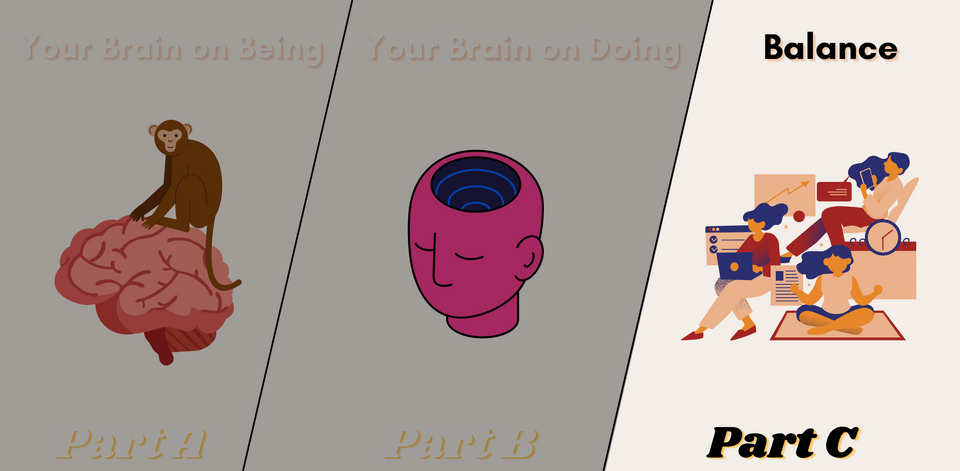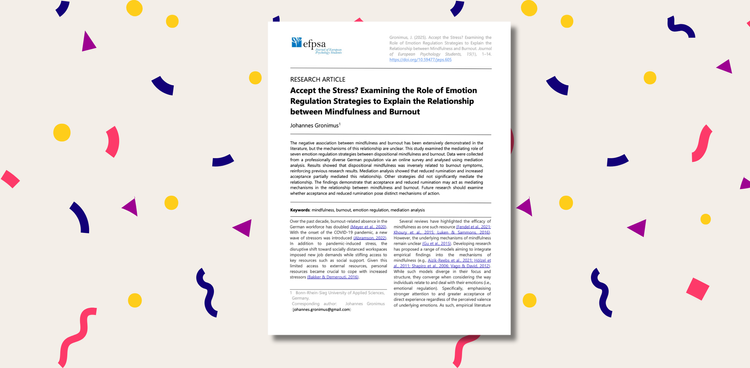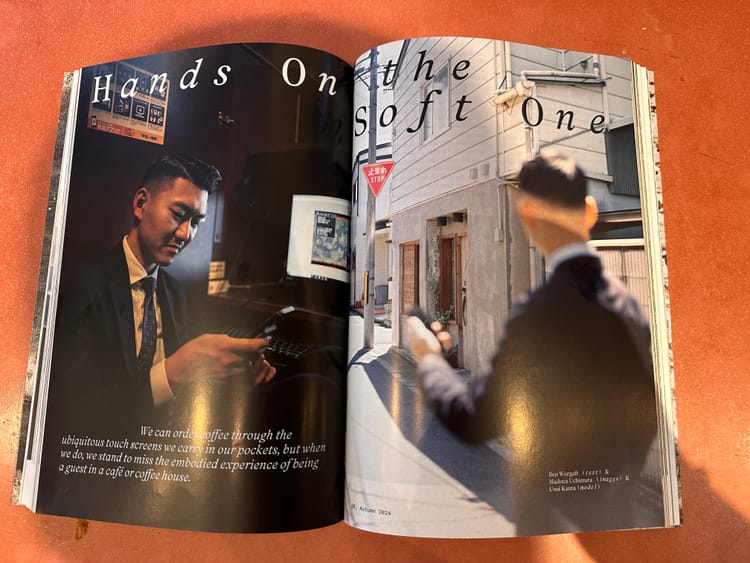Balance

Here’s the last Part of the 3-Part Balance Series. For this to make sense, I’d recommend reading Part 1 & Part 2 first 🤝
What’s the thing that drives you? Are you running from something? Running towards something? Do you wanna change something? Someone? Prove something - or someone wrong?
The landscape of human motivation is incredibly vast. No two people act from the exact same place. But there’s a thing we all have in common: We rarely question our motivation. And I don’t mean the surface level.
I mean the drivers that made you choose the path you’re on today, that make you thrive in some situations and struggle in others. The things that make you jump out of bed excitedly some days, and hide in your sheets the next.
Now, these are questions almost impossible to answer at full speed. To come back to the analogy from Part 1:
You see, when you’re running, everything along the way becomes blurry.
With social media feeds constantly flooded with others doing more, better and earlier than you, it’s no wonder so many feel behind in life (yours truly included). But if you feel behind, the pressing question is “How can I run faster?” - not “Why am I even running?”.
Today, I want to make the case that both of these questions are equally important - it's just about Balance. To get there, allow me 10 minutes and a bit of space in your favourite Notes app. So if you're in, let's go.
The ideal answer and the real answer
Mo Gawdat, CEO of Google X turned author, proposes a simple exercise:
Done? Good. What came up first is likely the ideal answer. I wanna help people. I wanna leave a mark. I wanna give back.
And there is truth in this. It corresponds to what psychologists call the ideal self - the aspirational version of your self-image. It’s just not the whole truth. To see, simply ask yourself again, honestly. Why?
If you drill down, you’ll likely find secondary targets. These are the motives psychologists attribute to the real self (the current version of your self-image) and often relate to insecurity and inadequacy.
“I wanna help people”, or “I wanna be admired”?
”I wanna leave a mark”, or “I wanna prove myself”?
Actually?
So now that we have the targets down, the important question becomes: Are you getting there? Running faster is great - but only if you're running in the right direction. In this environment of more, better & earlier it's easy to start internalising these expectations. It feels like climbing the ladder, getting rich and famous is what you want to do. And maybe it is. But I’d argue it’s worth questioning.
Cheeky enough, there’s a second part of the exercise for exactly that matter. Returning to your notes, compare your ambitions and your targets:
→ Will external admiration actually fix my own self-worth?
→ Will exceptional achievement actually make me feel like I’ve proven myself?
If your goals align with your drivers, congratulations. You’re on a wonderful path. But I know a guy that provides a great example of what happens when they don’t, but you never really check.
For 22 years, I was of the stern opinion that I don’t deserve the life I was blessed with. So I thought if I just make every single second count, maybe I can earn it. That was the target. All of my work was motivated by the drive to feel worthy of the life I had. But as you can probably imagine, that approach never really worked out. So instead of wondering if I was on the right path, I decided I just wasn’t doing enough.
It ramped up slowly, but surely. Right before the Burnout, I had planned out 7 days a week, 5am to 9pm, “using my time well” on the way to earning my space in this world. When my body kept asking to slow down from exhaustion, I decided that wouldn’t be a good use of time. So at some point, my body just stopped asking.
In retrospect, it feels kinda funny - my research paper I wrote to “use my semester break well” examined the effects of Meditation on Burnout. But in that moment, watching the sun come up over the ocean on a Sunday Morning, I didn't feel a thing. I was watching the thing I love most with complete apathy. No joy, no sorrow or anything in between. The night before, I had gone to bed at 7pm. Not because I was tired, but because nothing seemed worth doing, so I just decided the day might as well be over. Basically, I’d reached a point where I couldn’t deny that my approach wasn’t working.

Growing Pains
So, why am I sharing this? First, this is just what happens when you get so lost in the doing cycle you forget why you even started. Because I never took the time to question it, the whole foundation of my approach was shaky. I’d assumed that my worth as a human being was dependent on using my time well. It just took everything crumbling beneath me to recognise that this assumption might be wrong.
But there’s a second point I want to make here. A simple sentence my therapist said that stuck with me to this day. You see, admitting that the thing that drove you for the last 22 years was pure inadequacy is rather painful. So is losing all your drive and joy. So in our sessions, I kept referring to what happened as a “breakdown”. But that’s not entirely true. In our second session, she asked me:
“What if you were to look at this as growing pains?”
And I feel that’s what it is. Sure, it would’ve been wonderful to figure this out in a less disruptive way. But who knows if I would have truly understood what I was running from if it weren’t for the sessions that followed. Not that I was suddenly enlightened or something - it’s a process that I’m still trying to figure out. The point is that I now know there is something to figure out.
So the second point, in reality, is more like another question. One that, to my pre-burnout self seemed completely radical:
What if you’re already enough? What if there’s no need to justify your existence?
For real. Just feel for a second what these questions spark in you. Do you agree? Do you disagree? And what are the implications?
It took ages, but today, I think it’s true. How could we have been born into a debt this big? Responsible to justify an existence we never chose? I simply don’t believe that any sort of achievement could justify a gift as incredible as your life.
Still, this doesn’t mean ambition is bad & sitting around all day is the perfect life for everyone. Living a vivid life means living every facet of it. And there’s just so much fascinating stuff to Do - I don’t see the point in discrediting that.
Yeah, Doing isn’t inherently better than Being. But Being isn’t inherently better than Doing. Nothing is ever black and white.
There’s a balance to strike here - one that everybody has to figure out for themselves. However, this balance is so much easier to find when there’s no existential pressure weighing on it. When you don’t expect the next achievement to fix your innermost troubles. When you don’t despise yourself for needing a day off.
It’s so much more comfortable to keep doing. But in retrospect, I’m grateful for what happened. For where it brought me. And for the fact that it happened at 22, not 44. Because recognising that you were misaligned grants you the chance to realign. To pursue projects that actually match your targets. Not match some internalised expectations of what your targets should be.
It’s hard to navigate when you’re constantly running to catch up. Stuff along the way gets blurry. So if there’s anything to take away from the past few weeks, it’s this: Every once in a while, it’s important to check if you’re still running in the right direction. For the right reasons. And maybe it’s incredibly beautiful where you are, so it might be worthwhile stopping there for a quick minute (or 3).
PS: Here’s a free pass to just be for 3 minutes.




Comments ()